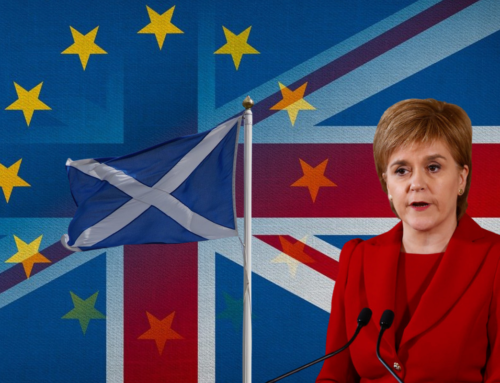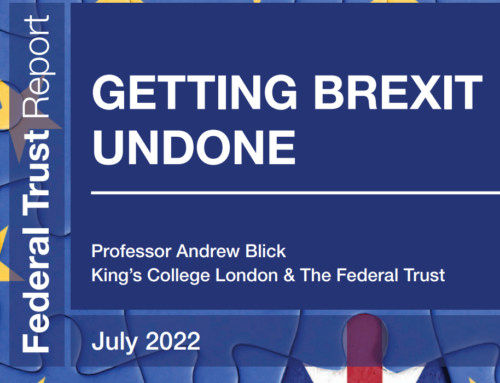
by Brendan Donnelly
Director, The Federal Trust
9th July 2019
Much justified criticism has been heaped upon Boris Johnson and Jeremy Hunt for the unrealistic European policies they have promised the Conservative membership in the current leadership contest. It is not however always sufficiently understood how necessary such unrealistic promises are in order to win over the current Conservative membership; and how important these promises will be, once given, for the European policies pursued in government by Boris Johnson or Jeremy Hunt.
Both the candidates for the Conservative leadership will be well aware from personal experience of the attitudes among the Conservative membership starkly revealed in the Yougov poll of 18th June (see the poll here.) These attitudes will dictate the expectations reposed by the membership in any future leader of their Party. The survey shows that for the Conservative membership no political issue is of comparable importance to Brexit, and that this assessment is intimately linked to a number of other assumptions and preferences concerning a “no deal” Brexit. Many Conservative members do not believe that leaving the EU with “no deal” will cause the havoc widely predicted by Brexit’s opponents. Even if it did, a majority of Conservative members would apparently be prepared to tolerate a large measure of economic and political disruption within the UK, as long as Brexit is secured. This disruption could even include for more than half of Conservative members the destruction of the United Kingdom.
Brexiters first, Conservatives second
For Boris Johnson and Jeremy Hunt however the most significant finding of the Yougov poll will be that a majority of the Conservative membership is prepared to envisage the destruction of the Conservative Party itself in the pursuit of Brexit. Johnson and Hunt know that this is no mere rhetorical flourish or random speculation, but a real possibility brought into the sharpest possible focus by the results of the European Elections. Any future Conservative leader deemed insufficiently zealous in the pursuit of Brexit faces the imminent danger of a final mass migration of the Conservative Party’s membership to the Brexit Party, for which many Conservative members voted on 23rd May. With the growing possibility of a General Election’s being held before the end of the year, no aspirant leader of the Conservative Party can risk terminally alienating so substantial a tranche of the Party’s members. If most Conservative members regard Brexit by 31st October at the latest as the absolute condition of their continuing Conservative membership, both Hunt and Johnson will see little alternative to shaping their leadership campaigns and succeeding Premiership around this constraining political reality.
It is probable that both Hunt and Johnson are aware of the economic and political disruption a “no deal” Brexit will involve. For that reason, both of them have been careful to avoid direct advocacy of such a course. Instead, they have claimed to believe that their superior negotiating skills will enable the rapid renegotiation of the Withdrawal Agreement in such a way as to make it acceptable to Parliament and the Conservative Party before 31st October. Whether this is deliberate mendacity or crippling self-delusion can only be a matter for speculation. In any event, these hopes bear no relation to reality. The Withdrawal Agreement, containing in particular the now contentious Irish backstop, can certainly never be renegotiated in such a way as to make it acceptable to the Conservative Party and probably not in such a way as to make it acceptable to Parliament either. Of these two hurdles, the veto of the Conservative Party will be, for the reasons already explained, the more important one for Johnson and Hunt.
If, as is likely but not entirely certain, Boris Johnson becomes Prime Minister in the last week of July, it is probable that he will be able to pass the month of August pretending to renegotiate the Withdrawal Agreement. His supporters in the Conservative press will be happy to accept for at least a few weeks confected stories about divisions within the EU, fear in Ireland of a hard border and looming budgetary chaos for the EU caused by “no deal.” When Parliament reconvenes in early September however, this charade will have reached its natural conclusion. Both Johnson and MPs hostile to “no deal” will be confronted with important and painful decisions.
What will happen in September?
In early September, Johnson as Prime Minister will have three possible options for advancing his party’s existential agenda of leaving the EU by 31st October, first to represent the Withdrawal Agreement to Parliament and succeed in having it passed; second to call a General Election for mid-October; or third simply to await the advent of Brexit with “no deal” on 31st October, thus defying the majority of MPs hostile to such an outcome. There seems little prospect of being able to reverse the preceding Parliamentary majorities against a largely unchanged Withdrawal Agreement; and a General Election before Brexit has occurred would give an unwelcome political opportunity to the Brexit Party, which could expect to make enormous inroads into the Conservative vote as the purist advocate of “no deal.” For all its dangers in the longer term, Boris Johnson may well conclude in September that his best course of action is simply to await the end of the extension negotiated by his predecessor and hope that the impact of leaving the EU without an agreement is less catastrophic in the short term than has been predicted. In the best of cases from his point of view, it might even be possible to hold a General Election before the end of the year, in which the Brexit Party was in disarray, while the full negative impact of a “no deal” Brexit had yet to be felt.
Many of the opponents of “no deal” in the House of Commons are already making plans on the basis that Boris Johnson will opt to take the risks inherent in leaving the EU without a Withdrawal Agreement. Bizarrely, the main party of opposition, the Labour Party, is still mired in slow-moving internal controversy about Europe and seems content to take its cue from the minority of Conservative dissidents, on whom all political attention can be expected to focus in early September. While it is clear that many Conservative MPs are uneasy about the economic and political impact of “no deal,” different estimates exist of the number of these MPs willing to take radical action to prevent the outcome they fear. The understandable if inglorious concern of many Conservative backbenchers will be that if they are too publicly active against Boris Johnson’s “no deal” strategy they may be deselected before the next General Election, which probably cannot anyway be long delayed. Other Conservatives have concluded they have little chance of reselection in any case and will be willing to pursue their opposition to “no deal” to the final limit of refusing to support the present Conservative government in a Motion of Confidence . Yet other Conservatives will be hoping to prevent a “no deal” Brexit without being forced to the extremity of provoking a new General Election which would perhaps allow Jeremy Corbyn to become the next Prime Minister.
It is however precisely the fragmentary and divided nature of the potential Conservative opposition to him that gives Boris Johnson his best chance to ensure a “no deal” Brexit. Dominic Grieve has said publicly that he would be prepared to vote in a Vote of Confidence against a Conservative government pursuing “no deal.” Other Conservative MPs have excluded any such possibility. There is a danger that, lacking the votes to bring about a Vote of No Confidence, Conservatives hostile to “no deal” will find themselves limited to indirect and procedural manoeuvres to make it more difficult for the government to continue along this path without Parliamentary scrutiny. Such tactics were tried in the early months of this year with only limited success. Before her volte-face in March, Theresa May was certainly under political pressure from the House of Commons to seek an extension of the Article 50 negotiating period. But it is at least questionable whether the House of Commons would have been able legally to compel her to do so without her own decision to change policy. The emergence of the Brexit Party has since made it impossible for her successor as leader of the Conservative Party to seek another extension without risking the irreparable fission of his Party. The British political system allows a wide measure of discretion, particularly in external relations, to the government of the day. If Parliament is unwilling or unable to replace the Conservative government before 31st October, there must be a risk that it will be unsuccessful in preventing “no deal” by the Parliamentary tacticking of Dominic Grieve and his associates.
A way out of the nervous breakdown
The former head of MI6, Sir John Sawers, recently described the United Kingdom as currently suffering a political nervous breakdown. For the past twenty years the epicentre of this nervous breakdown has been the Conservative Party, a reality which is only coming to be fully understood as a result of the current leadership contest. The hopes and expectations of many within and outside the Party that it will at some point revert to its traditional values of pragmatic moderation and enlightened self-interest are now shown to have been delusory. The Conservative Party cannot be reformed from within. The radical restructuring of the Party is an essential building-block of the general restructuring of the British party landscape. This general restructuring is the most urgent challenge for today’s political class. A group of forty Conservative MPs renouncing the Conservative whip and acting unitedly in the House of Commons would be a formidable political force entirely capable of exerting real pressure on Boris Johnson’s government in the short term and equally capable of fighting a General Election later in the year as part of a “Remain” electoral pact. In his resignation speech of 1990 Sir Geoffrey Howe described himself as having wrestled for “perhaps too long” with conflicts of loyalty brought about by his political differences with Margaret Thatcher. There are certainly many Conservative MPs who today are open to the same accusation. It was the abandonment by the Conservative Party of its long-standing commitment to full British membership of the European Union that led directly to the impending national catastrophe of Brexit. It would be entirely appropriate the reversal of that historic error had its origin in the Conservative Party as well. Brexit has destroyed the traditional Conservative Party. The fight against Brexit can provide an opportunity for its renaissance as well.







[…] by Charles Grant, the astute Director of the Centre for European Reform. Ultimately, though, as Brendan Donnelly has written this week, it may be that Tory rebels will have to toughen their resolve to really put paid to no-deal […]
[…] (that I and other authors on the Federal Trust website have previously addressed, see for example The Brexit Revolution Eats Its Conservative Parents and other Blogs), I will concentrate now on the constitutional aspect of such a […]
[…] Source: The Brexit Revolution Eats Its Conservative Parents | The Federal Trust […]